Just In
- 33 min ago

- 3 hrs ago

- 5 hrs ago

- 7 hrs ago

Don't Miss
- Movies
 Varshangalkku Shesham Box Office Collection: Vineeth Sreenivasan's Film Shines; Makes Over Rs 50 Crore
Varshangalkku Shesham Box Office Collection: Vineeth Sreenivasan's Film Shines; Makes Over Rs 50 Crore - Finance
 1:6 Split: Metal Giant Vedanta Shares Hit New 52-Week High On Big Announcement; Splitting Up By Dec-2024
1:6 Split: Metal Giant Vedanta Shares Hit New 52-Week High On Big Announcement; Splitting Up By Dec-2024 - Education
 IIT Madras Introduces International master's course on Water Security and Global Change
IIT Madras Introduces International master's course on Water Security and Global Change - News
 ED Attaches Actress Shilpa Shetty's Juhu Flat, Raj Kundra's Properties In Money Laundering Case
ED Attaches Actress Shilpa Shetty's Juhu Flat, Raj Kundra's Properties In Money Laundering Case - Sports
 Why is Dhanashree Verma not attending IPL 2024 matches of husband Yuzvendra Chahal?
Why is Dhanashree Verma not attending IPL 2024 matches of husband Yuzvendra Chahal? - Automobiles
 Kerala Spearheads Revival of Iconic Double-Decker Trains in India
Kerala Spearheads Revival of Iconic Double-Decker Trains in India - Technology
 Redmi Pad Pro 5G Likely to Launch Soon in India; Spotted on Google Play Console Database
Redmi Pad Pro 5G Likely to Launch Soon in India; Spotted on Google Play Console Database - Travel
 From Coconut Breaking on Head to Men Dressing as Women: 12 Unique Indian Rituals Explored
From Coconut Breaking on Head to Men Dressing as Women: 12 Unique Indian Rituals Explored
Guide On Post-delivery/Postpartum Problems That A Woman Goes Through
The article talks about the problems a woman faces post delivery and the care she should receive.
The process of giving birth is a biological miracle and a life-changing experience. The feeling of holding a new life you created with love is just out of this world!
One of the most challenging parts of the journey is done once the baby is born. And such is a mother's love that the baby always comes first hereon. However, just like your life, your body too changes post the delivery-and during the nine months-and needs to recuperate.
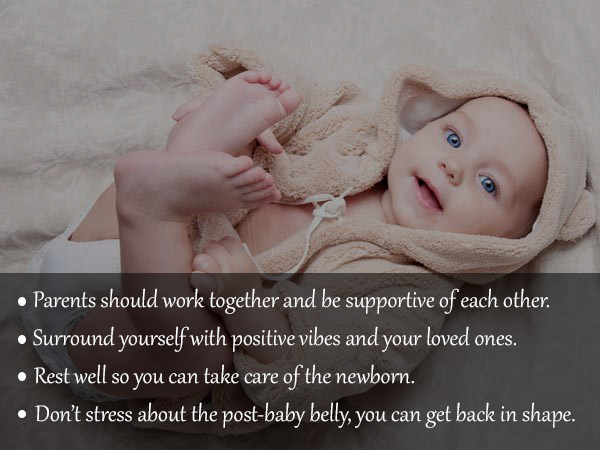


Here is a list of problems a woman might go through post delivery and the right guidance on how to face these biological challenges.
First 24 Hours Postpartum
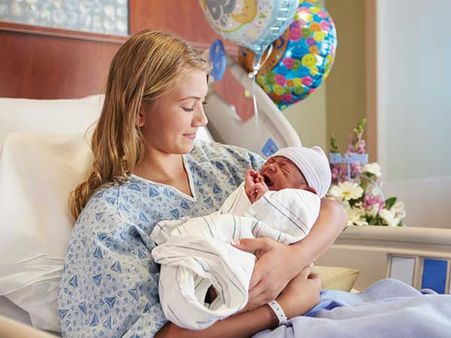
Postpartum Haemorrhage
Once the baby is delivered and the placenta successfully removed, it'll be followed by other vaginal discharges-fluids. The colour (bright red, pink, yellow, milky white, clear,etc), amount (heavy during the first few days and reduced flow later on) and odour (foul) will vary from menstrual bleeding.
This is perfectly normal and will start during the first 24 hours postpartum and last for about 2 weeks. Carry sanitary napkins or adult diapers with you and you should be good to go. If the discharge is excessive, it would be advised to talk to your doctor.
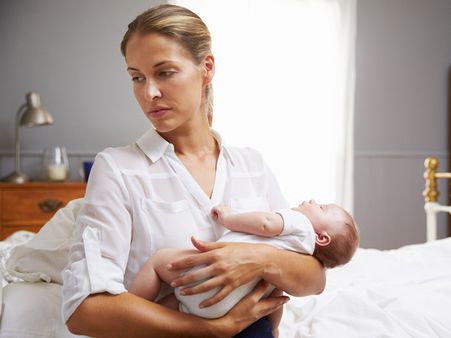
Infections
Ideally, the placenta should completely detach from the uterus post delivery. However, on rare occasions, a small part of the placenta can remain behind-retained placenta-and this can lead to uterine infections.
Is Alcohol Bad During Breastfeeding?
Bladder infections post delivery are caused when the catheter is not changed regularly. And when this infection spreads to the kidney, a kidney infection can occur.
These infections can all be treated, so be on the lookout for any symptoms-high fever, frequent urination, rapid heart rate-and consult the doctor if they are severe.
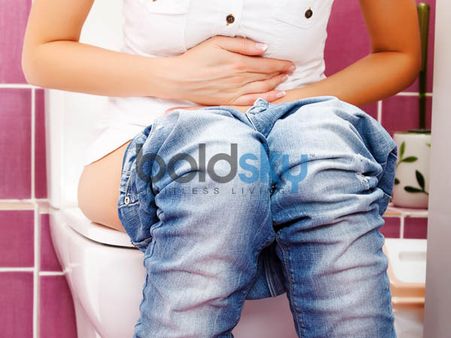
Constipation
Another problem women might face during the first 24 hours postpartum is constipation. To ensure a smooth and regular movement of the bowel, it is necessary to have a fibre-rich diet. Drink coconut water; eat fruits and food rich in iron.
A Week Post Delivery

Cramps
During the first week post delivery, it is natural to still feel the vaginal contractions. The uterus, while returning to its pre-pregnancy state, starts to tighten. To help soothe the cramps, you can use ice packs.

Engorged Breasts
A few days post delivery, the breasts can become hard, large and feel sore. However, the pain will ease over time once a breastfeeding pattern is established. Meanwhile, for comfort from the pain, apply a nipple cream, use ice packs or warm water compresses on the breasts. It is also advised to wear comfortable and loose-fitting bras and not too tight ones.
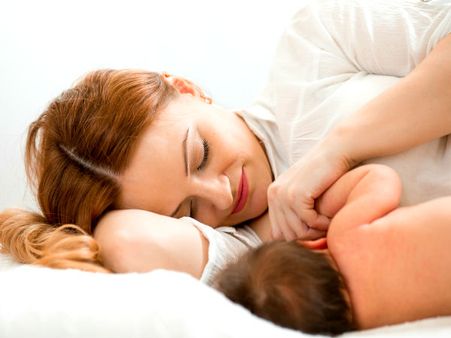
Breast Infection
During the time of breastfeeding, bacteria from the baby's mouth can enter the mother's body, especially if her nipples are cracked. This infection is called mastitis and its symptoms are constant breast pain, redness, nausea, vomiting, fatigue and headache.
Report the symptoms to your doctor and take medication so you and your baby can stay fit and healthy.

Water Weight
A lot of the weight a woman gains during pregnancy is because of the fluids in her body. Hence, within a few days after delivery, she sweats a lot and urinates quite frequently. In the night, especially, the sweating is profuse, so it is recommended to sleep on a towel.

Postpartum Depression
Becoming a parent comes with a lot of responsibilities, hormonal and physical changes and stress. Your whole life just completely gets changed. This realisation is sometimes out of the blue and is accompanied by depression and mood swings. This reaction in a nutshell is called postpartum depression.Those with a history of depression are more likely to be affected by postpartum depression.
The symptoms are getting negative thoughts quite often, not taking care of the baby and yourself, fear of not being able to care for your child and lack of interest in life and your baby. When you see these signs, talk to a doctor and get the right treatment, so you can enjoy this amazing new chapter in your life.
All these symptoms start within the first week and subside over the next 5-6 weeks. Some last only for 2-3 weeks. Then life with that perfect new addition begins and so does the roller-coaster ride of a lifetime!
Congratulations on becoming a new parent!
Did you find the article educational? Do share it to spread awareness and help someone in need.
-
 healthSolar Eclipse 2024: Dos and Don'ts for Pregnant Women During Surya Grahan
healthSolar Eclipse 2024: Dos and Don'ts for Pregnant Women During Surya Grahan -
 healthLunar Eclipse 2024: Dos And Don'ts For Pregnant Woman During Chandra Grahan
healthLunar Eclipse 2024: Dos And Don'ts For Pregnant Woman During Chandra Grahan -
 fashionDeepika Padukone-Ranveer Singh Announce Pregnancy: 6 Maternity Outfit Ideas For The Modern Mom-to-Be
fashionDeepika Padukone-Ranveer Singh Announce Pregnancy: 6 Maternity Outfit Ideas For The Modern Mom-to-Be -
 healthLate Singer Sidhu Moose Wala's Mother Is Pregnant Through IVF, Know What It Is And How To Prepare For It
healthLate Singer Sidhu Moose Wala's Mother Is Pregnant Through IVF, Know What It Is And How To Prepare For It -
 insyncVirat Kohli And Anushka Sharma Name Their Baby Boy 'Akaay', Know What This Beautiful Name Means?
insyncVirat Kohli And Anushka Sharma Name Their Baby Boy 'Akaay', Know What This Beautiful Name Means? -
 pregnancy parentingMaternal Health Awareness Day 2024: 15 Foods That Boost Maternal Health
pregnancy parentingMaternal Health Awareness Day 2024: 15 Foods That Boost Maternal Health -
 pregnancy parentingFrom Contractions To Water Breaking: Knowing When It's Time For The Hospital During Pregnancy
pregnancy parentingFrom Contractions To Water Breaking: Knowing When It's Time For The Hospital During Pregnancy -
 pregnancy parentingBirth Control Pills Can Affect This Primary Function In Women: Find Out What
pregnancy parentingBirth Control Pills Can Affect This Primary Function In Women: Find Out What -
 pregnancy parentingTwo Wombs, Four Hearts: US Mom's Extraordinary Double Uterus Pregnancy
pregnancy parentingTwo Wombs, Four Hearts: US Mom's Extraordinary Double Uterus Pregnancy -
 healthExclusive: A Pregnant Mom Can Posses These Maternal, Fetal Health Risks If Exposed To Air Pollution
healthExclusive: A Pregnant Mom Can Posses These Maternal, Fetal Health Risks If Exposed To Air Pollution -
 pregnancy parentingDelhi Air Pollution: Pregnant Women Must Follow These 4 Things!
pregnancy parentingDelhi Air Pollution: Pregnant Women Must Follow These 4 Things! -
 pregnancy parentingDelhi Air Quality Crisis: How Air Pollution Can Affect Unborn And Newborn Babies? Precaution Tips For Pregnant
pregnancy parentingDelhi Air Quality Crisis: How Air Pollution Can Affect Unborn And Newborn Babies? Precaution Tips For Pregnant


 Click it and Unblock the Notifications
Click it and Unblock the Notifications




